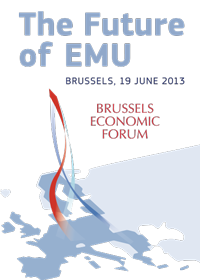
Accessibility tools
Service tools
Language selector
- Current language: en
Navigation path
- European Commission
- Economic and Financial Affairs
- Brussels Economic Forum 2013
- Recordings and photos
Fiscal and economic union
Looking closer at a fiscal union
The Brussels Economic Forum came to a close by a multi-faceted debate on the path leading to fiscal union, but also what is crucial for enhanced economic union, launched by MEP Sharon Bowles' statements and well-rounded views.
The Member of the European Parliament and Chair of the Committee on Economic and Monetary Affairs talked about looking realistically at the monetary union, “The starting point ... is that the monetary union was incomplete, and we have or are in the process of achieving better discipline now over budgets, this is harder to do when times are difficult, but then again may not have been done if these were not difficult times,” Bowles said.
What would however help bring a further economic or fiscal union is democratic accountability, this is still lacking as the institutions are “historically lacking of democracy; full of good intent but ties of trust are being broken,” Bowles underlined.
“Front loading the fiscal adjustment is better from all points of view, front loading countries tend to generate faster economic growth. In the Baltics, it took only two years; looking at Greece as a contrast, a back loader, we see six years of slow growth,” said Anders Åslund from the Peterson Institute for International Economics.
“If we compare the situation of fiscal federations with the current situation in the EU it is clear that it will take several years of fiscal and economic integration of the intensity that we find in fiscal federations, essentially because those federations are also based on political goals,” said Carlo Cottarelli from the International Monetary Fund. In conclusion, he listed four priorities to strengthen fiscal union in the EU, ranging from strong oversight of national fiscal policy, some sort of centralised budget to increase risk sharing, and a credible euro area financial backstop to some forms of common borrowing backed by common revenues as a backup to the banking union.
Focusing on the democratic will to move forward, Antonio Vitorino from Notre Europe the Jacques Delors Institute commented on one thing that is certain in Europe today, “Everybody wants the euro.
People are equally afraid of the break-up of the European Union,” he said.
Charles Wyplosz of the Graduate Institute of International and Development Studies took us one step further with the bigger picture, “The Maastricht Treaty was a miracle. And it would have been a total miracle if it had only been for two things, one, its lack of a banking union and, two, a mistake that the fiscal discipline framework was badly made and doomed to fail.”
“As we think about fixing the situation the risk is to do too little, while aiming at too much,” Wyplosz said. “Not to try to find the first solution but to recognise what is politically feasible and economically effective. It is unglamorous but it will work,” he said.
“This is the time to think about de-centralisation and effective de-centralisation,” Wyplosz stated.
Marco Buti, Director-General for Economic and Financial Affairs of the European Commission summarised the discussion including its historical background. On Cottarelli's and Wyplosz' comments as different options that floated in the debate, he concluded that “What we have done clearly is to steer the work towards something which is in between centralised and decentralised, as it usually happens in the European Union. We have moved away from the stability pact 1.0 which was a purely nominalist approach to a more 'complex one' to use Prodi's words at the time,” the Director-General said.
“What we are doing is to implement this in a difficult situation, with low growth and mounting unemployment, and we have shown that we can achieve an approach which can be seen as satisfactory,” Buti said.
“For future direction I would lean towards, Carlo (IMF) towards centralisation, being aware, however, of the political reality,” Buti said, as to strive towards a further fiscal union means reaching further into issues of national sovereignty and integration were the words that closed the day.























